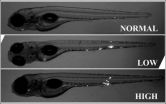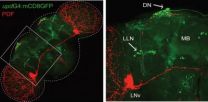(Press-News.org) Cleansing a newborn's umbilical cord with chlorhexidine can reduce an infant's risk of infection and death during the first weeks of life by as much as 20 percent, according to a study led by researchers at the Johns Hopkins Bloomberg School of Public Health. The study, conducted in rural Bangladesh in partnership with ICDDR,B and a Bangladeshi NGO Shimantik and funded by the United States Agency for International Development (USAID) and Save the Children's Saving Newborn Lives program, is the latest in a series of studies showing that umbilical cord cleaning with chlorhexidine can save lives. The latest findings will be published online February 8 by The Lancet.
For the study, Johns Hopkins researchers and colleagues in Bangladesh enrolled more than 29,000 newborns in a randomized trial to determine the effectiveness of single cleansing with 4 percent chlorhexidine or 7-day cleansing with chlorhexidine as compared to the standard dry cord care. According to the study, infants that received a single cleansing with chlorhexidine were 20 percent less likely to die compared to infants that received the standard dry cord care. Reductions in mortality were not statistically significant among the 7-day cleansing group compared to dry care, but they did have fewer signs of cord infection.
"Chlorhexidine cord cleansing is a simple, safe, effective, and inexpensive intervention. Large-scale implementation of this intervention with universal coverage has the potential to avert an estimated half a million neonatal deaths per year," said Abdullah Baqui, MBBS, DrPH, senior author and principal investigator of the study and professor in the Bloomberg School's Department of International Health.
An early study conducted by Johns Hopkins researchers in Nepal, showed cleansing the umbilical cord with chlorhexidine for 7 days of the first 10 days of life resulted in a 24 percent decrease in mortality compared to children who received dry-cord care. A separate study by researchers from Aga Khan University in Pakistan, which also appears in the current issue of The Lancet, found that cord cleansing with chlorhexidine reduced infant mortality 38 percent and infections by 42 percent.
"Giving birth and a child's first week is a risky time for a mother and her newborn," said Dr. Rajiv Shah, the Administrator of the U.S. Agency for International Development. "These studies provide evidence of a simple, low-cost technology that can prevent illness and death for the most vulnerable children. USAID is committed to transforming research into better results and access to life saving interventions."
Neonatal deaths account for more than 40 percent of the estimated 8.8 million deaths of children under 5 each year worldwide. In high mortality settings, more than half of those neonate deaths are the result of serious infection.
###Authors of "The effect of cord cleansing with chlorhexidine on neonatal mortality in rural Bangladesh: a community-based, cluster-randomised trial" are Shams El Arifeen, Luke C. Mullany, Rasheduzzaman Shah, Ishtiaq Mannan, Syed M. Rahman, M. Radwanur R Talukder, Nazma Begum, Ahmed Al-Kabir, Gary L. Darmstadt, Mathuram Santosham, Robert E. Black, Abdullah H. Baqui.
Chlorhexidine umbilical cord care can save newborn lives
2012-02-08
ELSE PRESS RELEASES FROM THIS DATE:
Press Release Distribution Service 24-7PressRelease Launches New Blog to Keep Industry Experts and Partners Up to Date
2012-02-08
Press release service 24-7PressRelease today announced the release of its new blog, which can be found at the address: http://blog.24-7pressrelease.com.
The blog was designed to provide industry professionals with a go-to portal that provides news and updates, marketing tools, and helpful tips.
A section entitled Coffee Break will include light reading designed to offer the reader a reprieve from the daily grind. The blog will feature a roster of press releases, regularly updated.
24-7PressRelease is an online press release service that provides its clients with ...
Treatment for tuberculosis can be guided by patients' genetics
2012-02-08
A gene that influences the inflammatory response to infection may also predict the effectiveness of drug treatment for a deadly form of tuberculosis.
An international collaboration between researchers at the University of Washington in Seattle, Duke University, Harvard University, the Oxford University Clinical Research Unit in Vietnam and Kings College London reported these findings Feb. 3 in the journal Cell.
These results suggest the possibility of tailoring tuberculosis treatment, based on a patient's genetic sequence at a gene called LTA4H, which controls the ...
Study: Breastfeeding can be tougher for women when pregnancy is unplanned
2012-02-08
Women who did not plan to get pregnant are much more likely to stop breastfeeding within three months of giving birth, according to a study published in the journal Current Anthropology. The research suggests that women whose pregnancies were unplanned often experience more emotional and physical discomfort with breastfeeding compared to women who planned to get pregnant.
More than 40 percent of the women in the study, which focused on mothers from low-income neighborhoods in São Paulo, Brazil, had stopped exclusively breastfeeding by three months, despite the fact that ...
Drinking large amounts of soft drinks associated with asthma and COPD
2012-02-08
A new study published in the journal Respirology reveals that a high level of soft drink consumption is associated with asthma and/or chronic obstructive pulmonary disease (COPD).
Led by Zumin Shi, MD, PhD, of the University of Adelaide, researchers conducted computer assisted telephone interviewing among 16,907 participants aged 16 years and older in South Australia between March 2008 and June 2010 inquiring about soft drink consumption. Soft drinks comprised Coke, lemonade, flavored mineral water, Powerade, and Gatorade etc.
Results showed that one in ten adults drink ...
Scripps research and technion scientists develop biological computer to encrypt and decipher images
2012-02-08
LA JOLLA, CA -- Scientists at The Scripps Research Institute in California and the Technion–Israel Institute of Technology have developed a "biological computer" made entirely from biomolecules that is capable of deciphering images encrypted on DNA chips. Although DNA has been used for encryption in the past, this is the first experimental demonstration of a molecular cryptosystem of images based on DNA computing.
The study was published in a recent online-before-print edition of the journal Angewandte Chemie.
Instead of using traditional computer hardware, a group ...
Largest Health and Wellness Company Expands Offerings and Announces Company Name Change to Wilkins Solutions
2012-02-08
The nation's largest health, fitness, recreation, and amenities distributor has changed its name from Wilkins Fitness Enterprises to Wilkins Solutions Enterprises. No longer just selling commercial fitness equipment such as treadmills, ellipticals, and strength equipment, Wilkins' offerings now include playground equipment, flooring, rehab equipment, patio furniture, and ADA compliant pool lifts in addition to their previous lines. To reflect its wider diversity of offerings, the holding company has formally announced a change in its name.
The name change comes on the ...
Fall of Communism changed mathematics in US: New study
2012-02-08
The collapse of the Soviet Union in 1992 brought an influx of Soviet mathematicians to U.S. institutions, and those scholars' differing areas of specialization have changed the way math is studied and taught in this country, according to new research by University of Notre Dame Economist Kirk Doran and a colleague from Harvard.
Titled "The Collapse of the Soviet Union and the Productivity of American Mathematicians," the study will appear in an upcoming edition of the Quarterly Journal of Economics.
"In this paper, we examine the impact of the ...
Justifying insurance coverage for orphan drugs
2012-02-08
How can insurers justify spending hundreds of thousands of dollars per patient per year on "orphan drugs" – extremely expensive medications for rare conditions that are mostly chronic and life-threatening -- when this money could provide greater overall health benefit if spread out among many other patients? Those spending decisions reflect the "rule of rescue," the value that our society places on saving lives in immediate danger at any expense. But the broad application of the rule of rescue will be increasingly difficult to support as "personalized medicine" produces ...
Post surgical phone support improves outcome following knee replacement
2012-02-08
SAN FRANCISCO -- Poor emotional health and morbid obesity are associated with less functional gain following total knee replacement (TKR) surgery. In the new study, "Can Telephone Support During Post-TKR Rehabilitation Improve Post-op Function: A Randomized Controlled Trial," presented today at the 2012 Annual Meeting of the American Academy of Orthopaedic Surgeons (AAOS), approximately 180 patients were categorized by gender, body mass index (BMI) and emotional health. Each patient randomly received either emotional telephone support by a trained behavioral specialist, ...
Molecular path from internal clock to cells controlling rest and activity
2012-02-08
PHILADELPHIA – The molecular pathway that carries time-of-day signals from the body's internal clock to ultimately guide daily behavior is like a black box, says Amita Sehgal, PhD, the John Herr Musser Professor of Neuroscience and Co-Director, Comprehensive Neuroscience Center, at the Perelman School of Medicine, University of Pennsylvania.
Now, new research from the Sehgal lab is taking a peek inside, describing a molecular pathway and its inner parts that connect the well-known clock neurons to cells governing rhythms of rest and activity in fruit flies. Sehgal is ...


